



Scratch is a programming environment that is easy to use and created with children in mind. Create and share your own interactive stories, games, music and art!
Codasign in partnership with Furtherfield will be running two Scratch workshops for children and their parents at Furtherfield Gallery on Saturday 13 April: a morning session with 6-9 year olds (10-12pm) and an afternoon one with 9-12 year olds (1:30-4pm).
Please book your place.
All supporting material for the workshop will be available at learning.codasign.com.
You will design and make a game or animation using the Scratch environment.
You only need to have big ideas – no other experience required.
You need to bring a laptop and an adult. The same adult can accompany multiple children. If you aren’t able to bring a laptop, just let us know by adding a note to your registration or e-mailing info@codasign.com.
There will be drinks available, but you are welcome to bring along some snacks to feed your creativity.
Full refund if registration is cancelled over a week before the course start, 50% if within a week of the course start, and no refund if within 24 hours of the course start.
VISITING INFO
Furtherfield Gallery
McKenzie Pavilion
Finsbury Park, London, N4 2NQ
Scratch is a programming environment that is easy to use and created with children in mind. Create and share your own interactive stories, games, music and art!
MaKey MaKey is a kit that lets you turn anything into a controller. Let your imagination go wild!
Codasign in partnership with Furtherfield will be running two Scratch + MaKey MaKey workshops for children and their parents at Furtherfield Gallery on Sunday 14 April: a morning session with 6-9 year olds (10-12pm) and an afternoon one with 9-12 year olds (1:30-4pm).
Please book your place.
All supporting material for the workshop will be available at learning.codasign.com.
During this workshop, the children will practice using computational thinking and interactive design in creative projects through a variety of activities. The adults will even play a key role in these activities.
You only need to have big ideas – no other experience required.
You need to bring a laptop and an adult. The same adult can accompany multiple children. If you aren’t able to bring a laptop, just let us know by adding a note to your registration or e-mailing info@codasign.com.
There will be drinks available, but you are welcome to bring along some snacks to feed your creativity.
Full refund if registration is cancelled over a week before the course start, 50% if within a week of the course start, and no refund if within 24 hours of the course start.
VISITING INFO
Furtherfield Gallery
McKenzie Pavilion
Finsbury Park, London, N4 2NQ
Scratch is a programming environment that is easy to use and created with children in mind. Create and share your own interactive stories, games, music and art!
MaKey MaKey is a kit that lets you turn anything into a controller. Let your imagination go wild!
Codasign in partnership with Furtherfield will be running two Scratch + MaKey MaKey weekend workshops for children and their parents at Furtherfield Gallery on Saturday 16 and Sunday 17 March: a morning session with 6-9 year olds (10-12pm) and an afternoon one with 9-12 year olds (1:30-4pm).
Please book your place.
All supporting material for the workshop will be available at learning.codasign.com.
During this workshop, the children will practice using computational thinking and interactive design in creative projects through a variety of activities. The adults will even play a key role in these activities.
You only need to have big ideas – no other experience required.
You need to bring a laptop and an adult. The same adult can accompany multiple children. If you aren’t able to bring a laptop, just let us know by adding a note to your registration or e-mailing info@codasign.com.
There will be drinks available, but you are welcome to bring along some snacks to feed your creativity.
Full refund if registration is cancelled over a week before the course start, 50% if within a week of the course start, and no refund if within 24 hours of the course start.
VISITING INFO
Furtherfield Gallery
McKenzie Pavilion
Finsbury Park, London, N4 2NQ
Scratch is a programming environment that is easy to use and created with children in mind. Create and share your own interactive stories, games, music and art!
Codasign in partnership with Furtherfield will be running two Scratch weekend workshops for children and their parents at Furtherfield Gallery on Saturday 09 and Sunday 10 March: a morning session with 6-9 year olds (10-12pm) and an afternoon one with 9-12 year olds (1:30-4pm).
Please book your place.
All supporting material for the workshop will be available at learning.codasign.com.
What will you do and learn?
You will design and make a game or animation using the Scratch environment.
What do you need to already know?
You only need to have big ideas – no other experience required.
What do you need to bring?
You need to bring a laptop and an adult. The same adult can accompany multiple children. If you aren’t able to bring a laptop, just let us know by adding a note to your registration or e-mailing info@codasign.com.
What will be available during the workshop?
There will be drinks available, but you are welcome to bring along some snacks to feed your creativity.
Cancellation Policy
Full refund if registration is cancelled over a week before the course start, 50% if within a week of the course start, and no refund if within 24 hours of the course start.
VISITING INFO
Furtherfield Gallery
McKenzie Pavilion
Finsbury Park, London, N4 2NQ
Scratch is a programming environment that is easy to use and created with children in mind. Create and share your own interactive stories, games, music and art!
MaKey MaKey is a kit that lets you turn anything into a controller. Let your imagination go wild!
Codasign in partnership with Furtherfield will be running two Scratch + MaKey MaKey workshops for children and their parents at Furtherfield Gallery on Saturday 23 February: a morning session with 6-9 year olds (10-12pm) and an afternoon one with 9-12 year olds (1-4pm).
Please book your place.
All supporting material for the workshop will be available at learning.codasign.com.
What will you do and learn?
During this workshop, the children will practice using computational thinking and interactive design in creative projects through a variety of activities. The adults will even play a key role in these activities.
What do you need to already know?
You only need to have big ideas – no other experience required.
What do you need to bring?
You need to bring a laptop and an adult. The same adult can accompany multiple children. If you aren’t able to bring a laptop, just let us know by adding a note to your registration or e-mailing info@codasign.com.
What will be available during the workshop?
There will be drinks available, but you are welcome to bring along some snacks to feed your creativity.
Cancellation Policy
Full refund if registration is cancelled over a week before the course start, 50% if within a week of the course start, and no refund if within 24 hours of the course start.
VISITING INFO
Furtherfield Gallery
McKenzie Pavilion
Finsbury Park, London, N4 2NQ
MaKey MaKey is a kit that lets you turn anything into a controller. Let your imagination go wild!
Codasign in partnership with Furtherfield will be running two MaKey MaKey workshops for children and their parents at Furtherfield Gallery on Saturday 16 February: a morning session with 6-9 year olds (10-12pm) and an afternoon one with 9-12 year olds (1-4pm).
All supporting material for the workshop will be available at learning.codasign.com.
What will you do and learn?
During this workshop, the children will practice using computational thinking and interactive design through a variety of activities.
What do you need to already know?
You only need to have big ideas – no other experience required.
What do you need to bring?
You need to bring a laptop and an adult. The same adult can accompany multiple children. If you aren’t able to bring a laptop, just let us know by adding a note to your registration or e-mailing info@codasign.com.
What will be available during the workshop?
There will be drinks available, but you are welcome to bring along some snacks to feed your creativity.
Cancellation Policy
Full refund if registration is cancelled over a week before the course start, 50% if within a week of the course start, and no refund if within 24 hours of the course start.
VISITING INFO
Furtherfield Gallery
McKenzie Pavilion
Finsbury Park, London, N4 2NQ
Scratch is a programming environment that is easy to use and created with children in mind. Create and share your own interactive stories, games, music and art!
Codasign in partnership with Furtherfield will be running two Scratch workshops for children and their parents at Furtherfield Gallery on Saturday 09 February: a morning session with 6-9 year olds (10-12pm) and an afternoon one with 9-12 year olds (1-4pm).
Please book your place.
All supporting material for the workshop will be available at learning.codasign.com.
What will you do and learn?
You will design and make a game or animation using the Scratch environment.
What do you need to already know?
You only need to have big ideas – no other experience required.
What do you need to bring?
You need to bring a laptop and an adult. The same adult can accompany multiple children. If you aren’t able to bring a laptop, just let us know by adding a note to your registration or e-mailing info@codasign.com.
What will be available during the workshop?
There will be drinks available, but you are welcome to bring along some snacks to feed your creativity.
Cancellation Policy
Full refund if registration is cancelled over a week before the course start, 50% if within a week of the course start, and no refund if within 24 hours of the course start.
VISITING INFO
Furtherfield Gallery
McKenzie Pavilion
Finsbury Park, London, N4 2NQ
THE CRYSTAL WORLD
The White Building, London
3 August – 30 August 2012
The Space’s White Building cultural centre is within walking distance of the 2012 Olympic stadium in post-industrial, post-regeneration London. As I walked down the steps that lead to it I saw a diesel locomotive pulling a train of cargo containers across an old railway bridge over the canal nearby. Millions of these rational forms will be in transit around the world at any given moment, arranged in two or three dimensions like crystalised capital on trains and docks and ships.
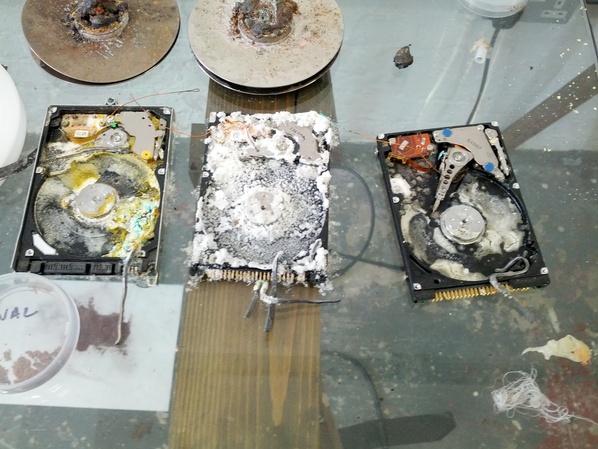
The logistics of their production and distribution are determined by computing machinery using algorithms that operate with inhuman speed and complexity. This same economic logic warps the architecture of the area around The White Building, with old factories and warehouses retro-fitted as office space and as gallery space.
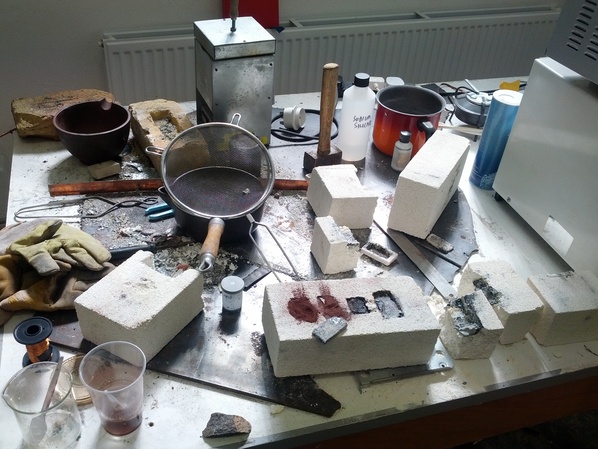
Inside the White Building’s project space the computational enabling technology of the global economy is the subject of a show by Martin Howse, Ryan Jordan and Jonathan Kemp. It takes the title of J. G. Ballard’s novel “The Crystal World” as its starting point. In Ballard’s novel a virus progressively turns all life – vegetable, animal and human – into crystal forms frozen in time. It is a Cold War allegory of the catastrophic imposition of rigid order.
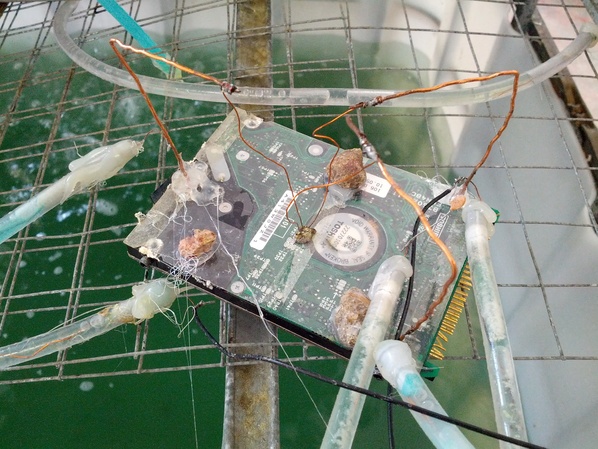
For Howse, Jordan and Kemp these imaginary crystals become the very real minerals refined in the production of the computing machinery used to structure our contemporary world. Inside every digital computer are wires, circuit boards, integrated circuits and other components. They are made from iron, copper, phosphorous, boron, tantalum and other rare earth elements. The central processing unit of a computer keeps time using a quartz crystal. The products of deep geological time are suddenly unearthed and set to pulsating millions of times a second.
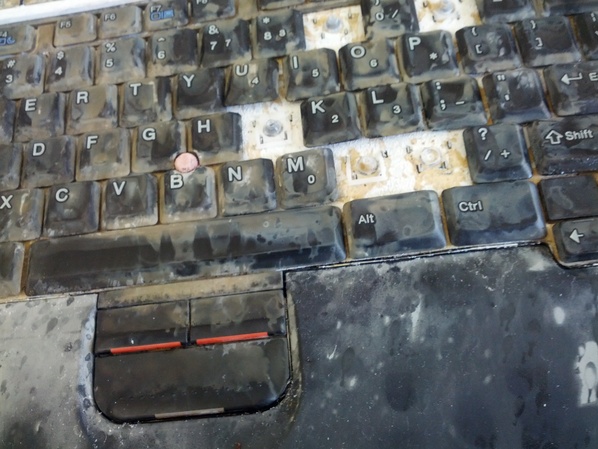
Computers are crystal engines. They are mineral fetishes that we use to manipulate powerful unseen forces that we believe we have mastered, like crystal healers working with a patient’s energy grid. But they are so invisibly familiar to us as our smartphones and laptops and their use in logistics and media is so pervasive that it takes an effort for us to perceive their operation or their implications.
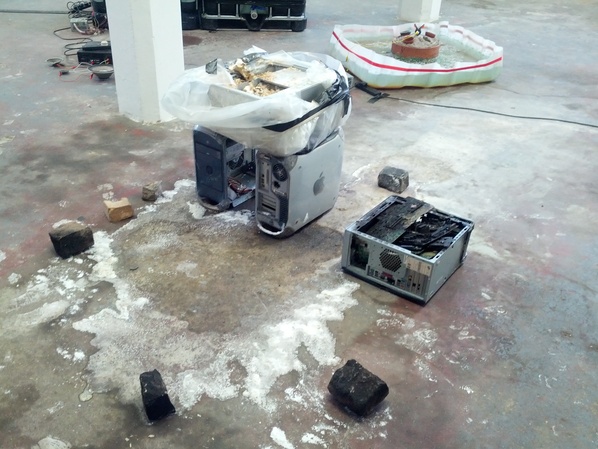
It takes almost two tonnes of raw materials to make a desktop PC. Unlike “Tantalum Memorial” (2008), by Harwood, Wright and Yokokoji, “The Crystal World” focuses on these raw materials geologically and temporally rather than geopolitically. But computing waste is toxic and valuable. The former makes disposing of old computers a growing problem, the latter makes recycling old computers a growing business. The minerals that computers contain can be recycled where they are valuable enough, or left to leach into the water supply in e-waste dumps where they are not.
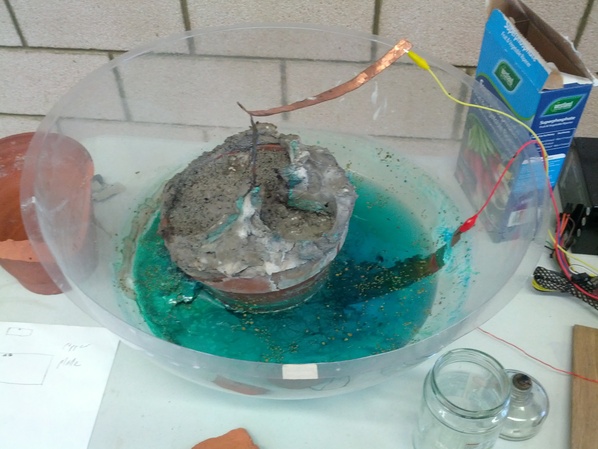
Or in the case of “The Crystal World” an open laboratory and the resultant art installation can re-extract them from their components and printed circuit boards using acid, water, electricity and heat in order to re-crystalise them and return them to geological time. The gleaming silent boxes that organize and mediate our lives are returned if not to the earth from whence they came then at least to their raw materials.
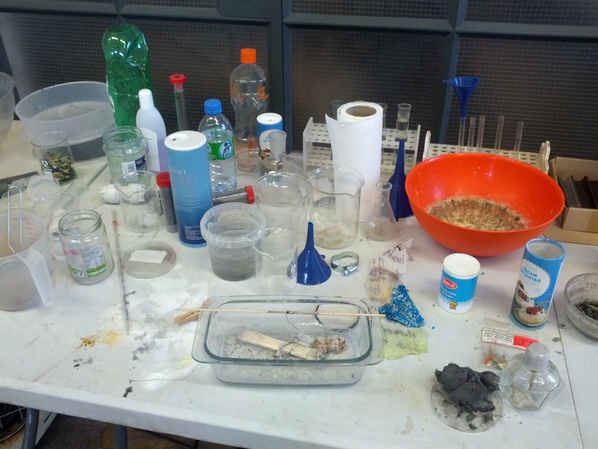
Tables edge the White Building project space, covered with the equipment and results of five days of workshops (and one with books, including Ballard’s, giving any spectators unsure of what is happening a conceptual framework to proceed from). Table after table of crystals, circuit boards, jars, electical equipment, and wires are overwhelming in the details of their appearance and implication. These traces of human activity and inquiry frame the flow of water and electricity in the center of the space, convincing the viewer of the creative intent of its production and drawing them in to its logical universe.
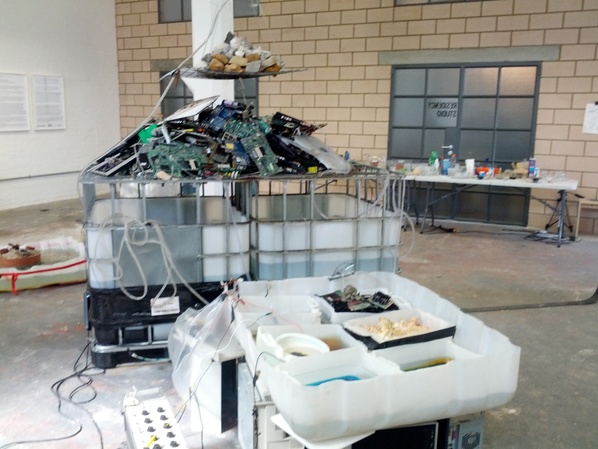
The centre piece of the show is a favela chic water feature that drips acid-loaded water through calcinous rock fragments, over e-waste, into two cut plastic-drum tanks. Next to it an array of smaller plastic containers contain circtuit boards having their copper leeched from them by acid, fungus growing on the by-prodcucts of the project, and other watery deconstructions of computing machinery. It looks dangerous and uncertain, deconstructing both the physicality and the meaning of computers. Seeing the innards of an IBM ThinkPad computer becoming encrusted with calcium like a digital stalagtite, or CPUs branching feathery crystals, returns computing machinery to its raw mineral state. FLOPS give way to eons once more. Neither is a human timescale, yet we must live between them at the moment.

The most fantastical artifact along the walls of the project space is the “Earth Computer”. It’s a battery-like construct of recycled copper and zinc in a tray of silver nitrate attached to lightning conductor-style copper strips. Sitting in earth on a plastic sheet and surrounded by the left-over materials of its creation for the duration of the show, it will be buried nearby afterward. Such a device can function effectively, but not literally. It is more likely to spring to life in the mind of the viewer than if it is struck by lightning. It is effective art, psychic engineering rather than technological cargo culting.
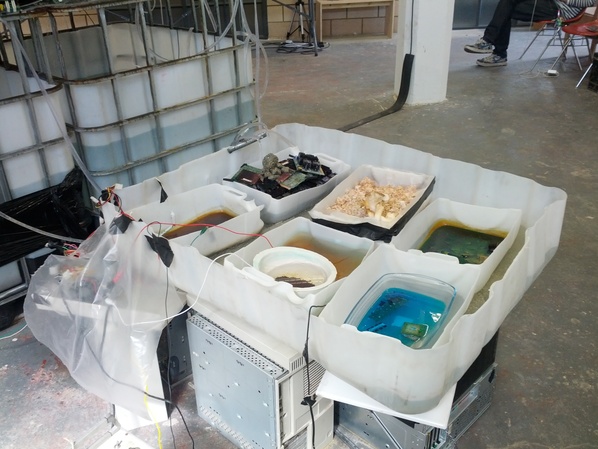
Acid, water and electricity mixed together with e-waste look and feel dangerous. The recycled ad-hoc materials and equipment containing and channeling them reinforce this feel and leaven it with an aura of creative investigation. The form of the show is timeless, the workshop of the alchemist, outsider scientist, or mad inventor. Its content is very contemporary, from Ballard’s rising cultural stock and the social and environmental costs of e-waste to Long Now deep time and posthuman philosophy. Art symbolically resolves the gaps between ideology and reality, and computing is so pervasive and key to society that most people don’t even regard it as ideological never mind conceptualise its failings as such.
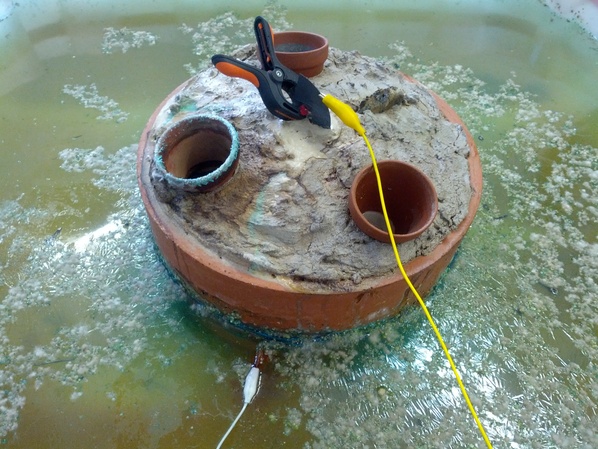
The water and abandoned human artefacts of some of the installations is more “Drowned World” than “Crystal World”, and the broken machinery is more “Crash”. Ballard’s catastrophes provide a modern mythology that is a more useful resource for art than its literary roots might suggest. It achieves the defamiliarising and critical impact of hauntological art without requiring its supernaturalism or nostalgia. There is a Ballardian attitude at play here.
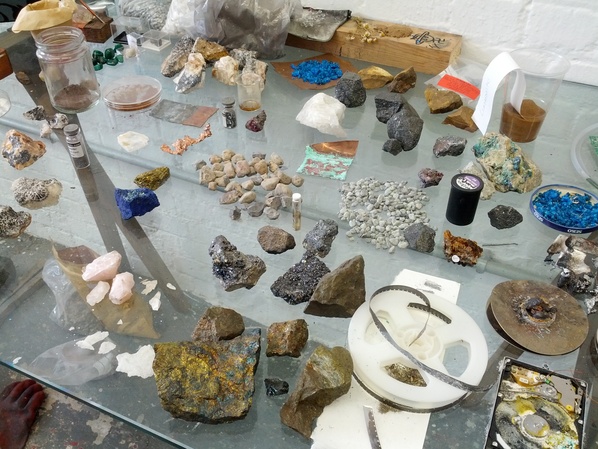
I found “The Crystal World” mind-blowing. It relates the tools of our human existence to non-human substances and timescales, providing the kind of corrective to anthropocentric vanity that object-oriented philosophy aspires to. It achieves this profound insight and presents it in an accessible way precisely because of the modesty of its materials and aesthetics, and because of the resonances of the cultural materials chosen as its starting point.
http://spacestudios.org.uk/whats-on/events/the-crystal-world-open-laboratory-exhibition-
The text of this review is licenced under the Creative Commons BY-SA 3.0 Licence.
Part of Furtherfield Open Spots programme.
Please join us for a drop-in ‘clipsourcing’ workshop led by Swedish artist Josefina Posch in collaboration with artist and new media developer Mike Blackman (UK).
Using online tools specifically created for the project, participants will identify who the speakers are, contribute keywords, and rate short movie clips from the online public domain Film Noir Archive. The contribution will help shape the final interactive piece that will be streamed live at Futherfield Gallery in December 2012.
See images of the workshop on Flickr.
{crowdsourced} Noir / Love Beyond Recognition is a process-based artwork encompassing a sculptural installation and an interactive stream across the World Wide Web. The origin of both parts of the project is based upon the notion of ‘crowdsourcing’. The principle being that more heads are better than one. By canvassing a large crowd of people for ideas, skills, or participation, the quality of content and idea generation will be superior. In this instance, crowdsourcing will be applied through the use of clipsourcing tools which have been developed to aid in project-related tasks that can only be achieved through human interaction/intervention. This way, the crowd will help the artist achieve these tasks whilst adding a democratic element to the final outcome of the project.
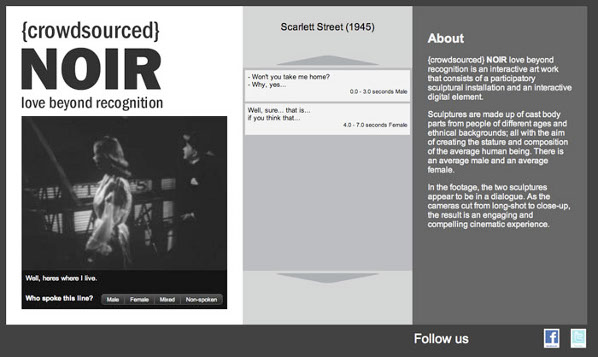
During Spring and Summer 2012, an interested public will be able to both participate and contribute to the project’s creative process in two distinct ways: in Sweden as models, whereby a cast will be taken of a chosen body part (the body parts will later be assembled to full figure sculptures) and in the UK by taking part in a workshop at Furtherfield Gallery to help source short clips from the Online Public Domain Film Noir Archive through our online tool. The final iteration of the project will be exhibited in Gothenburg, Sweden in December 2012 with live interactive streams at Furtherfield Gallery, London.
Josefina Posch
Josefina Posch is a Swedish artist that has worked and exhibited extensively abroad, including at the 52nd Venice Biennale, Fondazione Pistoletto’s Cittadellarte, Sculpturespace NY and a residency at Duolun Museum of Modern Art Shanghai. During her 3 month residency at Art Space, Portsmouth, in Autumn 2010, she began her collaboration with artist and new media developer Mike Blackman in the development of her digital concepts.
The project is supported by Arts Council England/British Council and the Gothenburg City Arts Council.
Furtherfield presents Moving Forest 500 Slogans workshop at Victoria & Albert Museum.
Join AKA the Castle for up to 5 slogan workshop sessions, December 2nd-4th at the V&A, as part of Moving Forest London 2012 initiative.
The Moving Forest 500 slogans workshop invites writers, artists, performers, theatre practitioners, soundists, noisers, singers (of all genres), scholars and folks to come together to contribute their readings of the 500 slogans written by Dr Matthew Fuller alongside Graham Harwood’s 12 hour rendering of the final 12 minutes of Kurosawa’s film version of Macbeth, Spider Web Castle.
Read, recite, sing, shout, scream, murmur, memorize and burn the slogans and plot the 500 slogans as the main thread through the 5 acts of MOVING FOREST.
Moving Forest is a 12 hour, five act, visual, sonic, digital, electronic and urban performance collectively realized by AKA the Castle, a temporal performance troupe bringing together visual artists, writers, soundists, silk threaders, codedecoders, macromikro, boombox mass, mobile agents, wifi fielders and urbanites. 12 hours of sonic, coded action map an imaginary Castle and camouflage forest revolt onto a given modern day metropolis.
We welcome public participation in Moving Forest 500 slogans workshops.
By participating, you join AKA the Castle’s collective reading and planning towards staging Moving Forest 12 hour performance in London summer 2012.
Please sign up below to take part in one or more workshop sessions.
Friday 02 December, 6-9pm
Saturday 03 December, 11-1pm
Saturday 03 December, 2-4:30pm
Sunday 04 December, 11-1pm
Sunday 04 December, 2-4:30pm
All workshops will take place in Seminar Room 1, Sackler Centre, V&A.
To sign up to one or more sessions please write to now@movingforest.net
or select your session on the 500 slogans wiki
http://scrying.org/doku.php?id=500slogans
Free workshop admission.
Victoria and Albert Museum
Seminar Room 1, Sackler Centre
Cromwell Road, London SW7 2RL
http://www.vam.ac.uk/
Additional workshop activity at SPACE as part of Moving Forest London 2012 initiative
More info: http://spacestudios.org.uk/whats-on/events-projects/moving-forest-pd-pure-data-workshop
More information about Moving Forest:
http://www.movingforest.net
http://movingforest.net/html/slogans.html
The partners for Moving Forest London workshop development are MA Interactive Media & Centre for Cultural Studies at Goldsmiths University of London, Furtherfield, SPACE, Digital Programmes,V&A.
AKA the Castle
Strategy workshops: How Can A Forest Move?
Part of Moving Forest London2012 development workshops
All events are free but space is limited.
Booking essential. Please RSVP to now@movingforest.net
Friday 9 December 2011, 11-4pm. Furtherfield Gallery
Isaac Marrero-Guillamón – The Militant City
Saturday 10 December 2011, 11-4pm. Furtherfield Gallery
Rachel Baker and Kayle Brandon – The Witches and 3-Keys
Monday 12 December 2011, 6-9pm. Furtherfield at SPACE MediaLab
The Laboratory of Insurrectionary Imagination presents:
TREE THOUGHTS: Strategies of artivisme and permaculture, a taster
Furtherfield Gallery, McKenzie Pavilion, Finsbury Park, London N4 2NQ
Friday 9 December 2011, 11-4pm
The Olympic mega-event is akin to Rancière’s ‘order of the police’. It regulates what is visible and invisible, sayable and unsayable, thinkable and unthinkable; it distributes individuals and groups in positions of ruler or ruled.” Join Isaac Marrero-Guillamón, researcher for The Militant City, in a discussion and workshop on exploring the role of art in relation to the Olympics, its legal architecture, and its elevation to a ‘state of exception’. Bring projects, ideas, stories and prepare for battle over the control of language, sign, transmission and public space.
Furtherfield Gallery, McKenzie Pavilion, Finsbury Park, London N4 2NQ
Saturday 10 December 2011, 11-4pm
Rachel Baker and Kayle Brandon jointly lead this day of prophecy, prediction and mobilization strategies for mapping the Moving Forest onto the London Olympics; tuning in the camouflaged branches to the contemporary mood of economic chaos and revolt.
Rachel Baker – Witches, Prophecy and Prediction
The story of Macbeth began with a witches’ prophecy and ended in murder and revolt. Did the witches predict a future already seen or did they merely plant some well-placed psychological seeds to trigger a self-fulfilling prophecy? In doing so, were they able to influence reality? What prior information did they need to have? Is it the magical, spectral appearance of the witch that lends the prophecy its power, or their insertion into everyday life?
Kayle Brandon- 3-Keys
The three witches’ prophecy and their tools and techniques of divination are deployed to make a card game called The 3-Keys. Illuminating insurgent mobilisation strategies, the game will map the key relational powers within the Olympic game, matching/twinning them with the essential Macbeth elemental and physical conditions. Discussion will surround further oracle, divination tools and techniques that enable one’s actions to be fated or influenced by these processes.
The Laboratory of Insurrectionary Imagination presents:
Furtherfield at SPACE MediaLab
, 129—131 Mare Street, London E8 3RH, 020 8525 4330
Monday 12 December 2011, 6-9pm
This workshop is a taster to methodologies that merge ecological design models of Permaculture with forms of creative resistance. Permaculture mimics the patterns of living systems and applies them to human designs, these whole system thinking tools will be applied to strategies for developing creative actions. The workshop is suitable for artists and activists of all sorts and with any kind of experience and aims to give a feel of how it might be to “think like a forest”.

The workshops are in preparation for a performance of Moving Forest, first presented at Transmediale.08 in Berlin, during London Olympics 2012 by AKA the Castle in partnership with MA Interactive Media & Centre for Cultural Studies at Goldsmiths, University of London, Furtherfield, Space, MzTEK, Digital Programmes and Victoria and Albert Museum.
A 12 hour, five act, visual, sonic, digital, electronic and urban performance collectively realized by AKA the Castle, a temporal performance troupe bringing together visual artists, writers, soundists, silk threaders, codedecoders, macromikro, boombox mass, mobile agents, wifi fielders and urbanites. 12 hours of sonic, coded action map an imaginary Castle and camouflage forest revolt onto a given modern day metropolis.
Isaac Marrero-Guillamón
Isaac Marrero-Guillamón is a sociologist/anthropologist. He has lived and worked in London since 2007. He is currently a post-doctoral research fellow at Birkbeck, University of London, undertaking a two-year project called The Militant City, which investigates artistic practices critical towards the Olympics.
Rachel Baker
Rachel Baker is a network artist who collaborated on the influential irational.org. Her art practice explores techniques used in contemporary marketing to gather and distribute data for the purposes of manipulation and propaganda. Networks of all kinds are “sites” for Baker’s public and private distributed art practice, including radio combined with Internet (Net.radio), mobile phones and SMS messaging, and rail networks.
Kayle Brandon
Kayle Brandon is a inter-disciplinary Artist/researcher, whose work is sited within the public, social realm. She predominantly works in collaborative and collective fields; a working method which informs much of her ethos around the making of art. Her main areas of interest are in the relationships between the natural and urban worlds and Human/Non-human relations. She investigates this field via physical intelligence, provocative intervention, observation, self-guided exploration and collective experiences.
The Laboratory of Insurrectionary Imagination
Infamous for fermenting mass disobedience on bicycles during the Copenhagen climate summit, throwing snowballs at bankers, touring the UK recruiting a rebel clown army and covering the Tate in unwanted molasses to get them to drop BP funding, The Laboratory of Insurrectionary Imagination (Lab of ii) exists somewhere between art and activism, protest and poetics.
Furtherfield Gallery, McKenzie Pavilion
Finsbury Park, London N4 2NQ. Open 11-4pm
For details on how to find us visit our contact page.
“All my life people have been telling me I was unique and then I saw myself on camera and realised I was – there is only one me! The film was a great achievement.”
Participants: 20 Year 4 students from Southwark Park Primary School.
Artist: Michael Szpakowski (video artist, composer and facilitator)
The Investigators followed a group of Year Four children and their teacher through their science studies for an entire school year.
Michael Szpakowski and Furtherfield made a documentary film with the children from Southwark Park Primary that examines the investigative skills in Science. The project focused on developing the use of digital media within the classroom, and as a tool for learning that the children can use themselves. Around a framework of footage shot in lesson time and on trips out is assembled other material – creative writing and artwork by the young people as well as re-enactments and discussion of the lessons.
Partners: Creative Partnerships, A New Direction, Southwark Park Primary School
Participants: 20 Year 4 students from Southwark Park Primary School.
Artist: Michael Szpakowski (video artist, composer and facilitator)
In a series of workshops to promote enthusiasm for maths within the school, a class of children aged 8-9 years old created Mad About Maths, a CDROM of 8 maths games, which encouraged them to test their ideas, use their own words, and try new approaches. The games were presented in a school event in which the pupils demonstrated the games to their family members and teachers. The pupils were able to share their learning and knowledge of calculation with their siblings and families in an engaging and fun way.
The CDRoms continue to be used in the home and in school with other classes to support enthusiasm and skills in maths.
Partners: Creative Partnerships, A New Direction, Southwark Park Primary School
A workshop exploring new, creative ways of using digital media to share ideas and develop them with others from around the world
“All of the Tigers thoroughly enjoyed your workshop, so much so that they continued developing their films for the rest of the week! I wanted to write to tell you how impressed I was by the thought and process you developed for the festival. From the opening ‘getting to know you’ game (genius!); to the group development of themes; to the concentration of the group as they engaged beautifully with VisitorsStudio – the whole day was very smooth and spot on :)” – Ruth Fenton, Arts Project Coordinator, Science Museum
Participants: 6-10 young people (16+ years old) from the Tigers Community Group
Artists: Ruth Catlow and Marc Garrett (Furtherfield.org Co-Directors)

As part of the Being Connected festival, hosted by The Science Museum, Furtherfield.org was commissioned to deliver a workshop using their online, audiovisual mixing software, VisitorsStudio. This day of activities offered 10 young women from the Tigers community group in West London the opportunity to learn new, creative ways of sharing ideas and developing them together. The participants reflected on how we are connected in our everyday experience as well as globally by physical, social and digital means. Using VisitorsStudio and Flickr photo-sharing application, the group learnt how to search for and remix audiovisual media, already created and shared by people around the world. The experience culminated with the production of a web-based show-reel of participants’ work. At the final event participants also shared what they had learnt with their friends and families showing how the software works so that they could get involved too. After the workshop many of the participants returned to VisitorsStudio to continue to develop their ideas.

The Being Connected festival explored contemporary issues and themes surrounding media art, digital technology and engineering through a series of innovative workshops for, run by artists and artist engineers.
Partners: Science Museum, Vital Regeneration
Related links: VisitorsStudio
Musical workshops inspiring a sense of wonder in the endless combinations of sounds and rhythms in poetry, song and nature.
Participants: 90 students between the ages of 10 and 14 from Horsenden Primary School.
Artist: Michael Szpakowski (video artist, composer and facilitator)
90 students between the ages of 10 and 14 from Horsenden Primary School engaged in an exploration of the seasons through spoken/sung words and rhymes, and collaborated to create a collection of musical pieces using a variety of musical instruments. This project supported children’s reading ability by exploring rhythm through music, as well as the creation of a permanent sound artwork for the school garden that changed with the seasons to inspire a sense of wonder in the endless combinations of sounds and rhythms in poetry, song and nature.
The artist Michael Szpakowski worked with 14 small groups of pupils doing music and sound drawing on quotes from nursery rhymes and using a range of stimulating and unusual ways of making sounds. The work was digitally recorded in order to create a “generative” piece of music and sound-scape. Generative means that the computer is programmed to play back the fragments of the sound in a semi-random order so that they would constantly unfold and combine in different ways, like a kind of musical kaleidoscope.
Partners:Creative Partnerships, Horsenden Primary School.
Inclusive filmmaking workshops to create a documentary challenging community perceptions of Grove Park Special School.
Participants: 20 students between the ages of 10 and 14 from Grove Park Special School in Brent
Artist: Michael Szpakowski (video artist, composer and facilitator)
20 students between the ages of 10 and 14 from Grove Park Special School in Brent explored and challenged community perceptions of the school in a series of visits and interviews with leading figures in the local community. The students, teachers, learning support assistants and Michael Szpakowski worked collaboratively in small groups to make a documentary film about the Borough of Brent, and the people who live and work there. Visits were made to 3 locations over 10 weeks: Brent Town Hall, Fryent Country Park and the nearby IKEA superstore. They were chosen because of their significance as providers of essential local community services. During these visits and interviews the students were encouraged to look outward and find their voices in the local community and throughout this process students and staff had the opportunity to learn valuable filmmaking and editing skills. The project has culminated in a DVD film, for distribution to all participants.
Partners: Creative Partnerships, Grove Park Special School